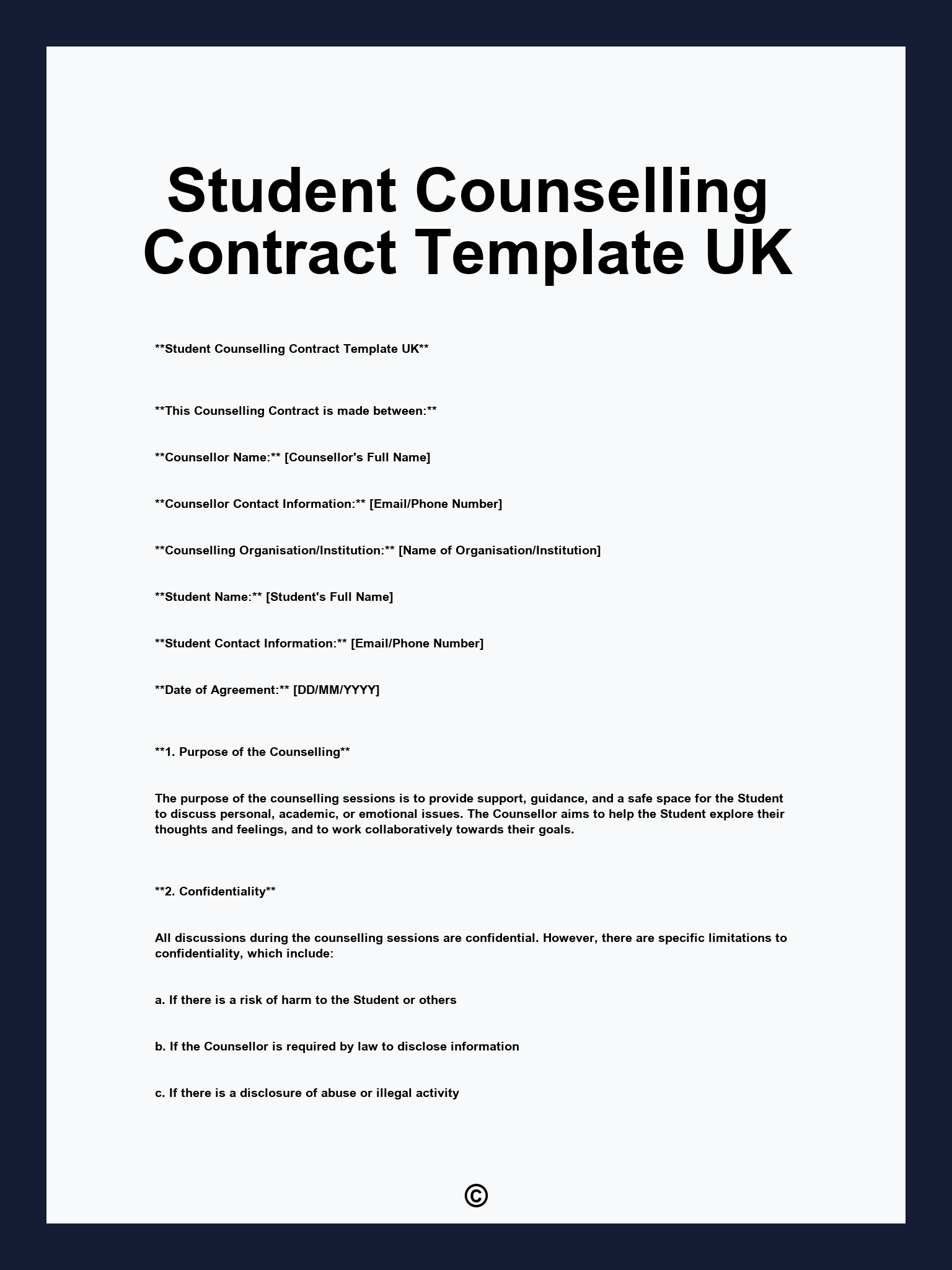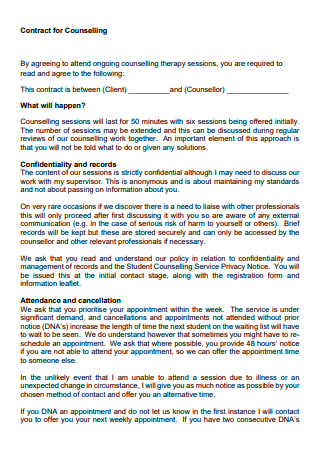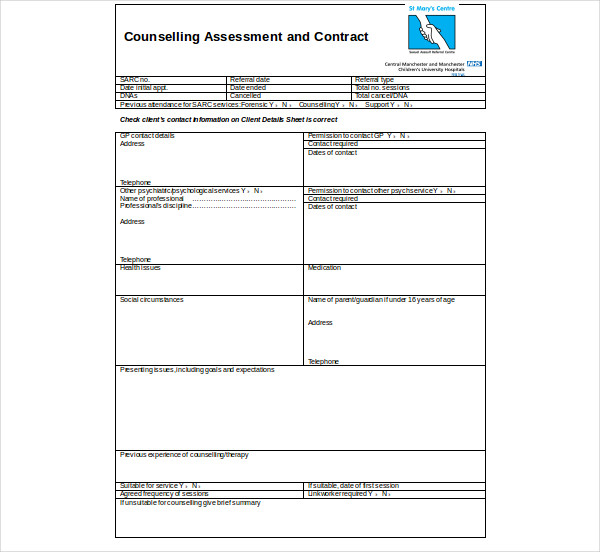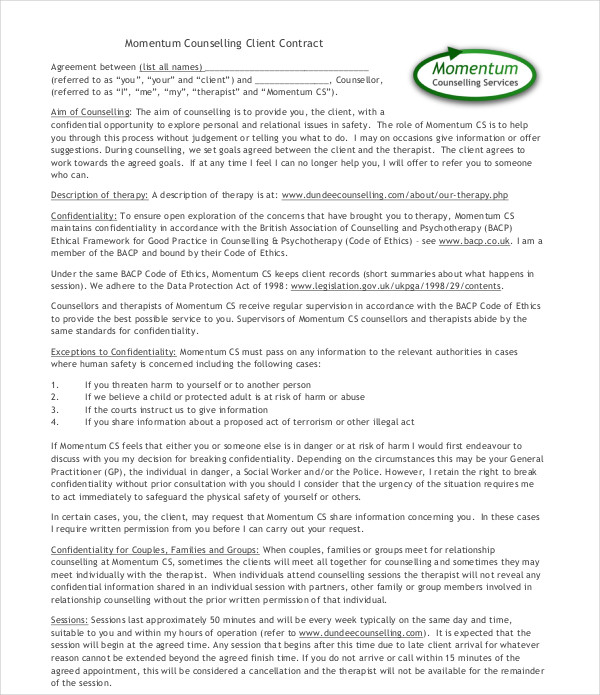The Person-Centred Counselling Contract Template You Need Right Now: A Guide for Therapists
Are you a person-centred counsellor looking to establish clear boundaries and expectations with your clients? A well-crafted counselling contract is essential for ethical practice, legal protection, and fostering a strong therapeutic alliance. It provides a framework for the counselling relationship, outlining the roles, responsibilities, and practicalities of your sessions. This article provides a comprehensive guide and insights into the key components of a person-centred counselling contract, equipping you with the knowledge to create a template that meets your needs and ensures informed consent.
Why is a Counselling Contract Essential?
Before diving into the specifics, let’s understand the critical role a counselling contract plays. It’s not just a formality; it’s a cornerstone of ethical practice. The contract serves several vital purposes:
- Informed Consent: It ensures clients fully understand the nature of therapy, the counsellor’s approach, and their rights and responsibilities.
- Boundary Setting: It clearly defines the parameters of the therapeutic relationship, including session frequency, duration, and fees.
- Legal Protection: It provides a documented agreement, potentially offering legal protection in case of misunderstandings or disputes.
- Clarity and Transparency: It promotes transparency and helps manage expectations, fostering trust and a strong therapeutic alliance.
- Professionalism: It demonstrates your commitment to ethical practice and your role as a professional.
Key Components of a Person-Centred Counselling Contract Template
A person-centred counselling contract differs slightly from other therapeutic approaches due to its emphasis on the client’s autonomy and self-direction. Here’s a breakdown of the essential elements:
1. Introduction and Welcome
- Warm Greeting: Start with a welcoming statement that sets a positive tone and emphasizes the collaborative nature of the relationship.
- Counsellor’s Credentials and Approach: Briefly introduce yourself, your qualifications, and a concise explanation of your person-centred approach. Highlight your commitment to empathy, congruence, and unconditional positive regard.
2. The Therapeutic Relationship
- Purpose of Counselling: Clearly state the purpose of counselling, focusing on the client’s goals and the potential benefits.
- Client Responsibilities: Outline the client’s role in the process, including active participation, honesty, and self-exploration.
- Counsellor Responsibilities: Detail the counsellor’s responsibilities, such as providing a safe and supportive environment, listening empathetically, and respecting the client’s autonomy.
- Confidentiality: This is a critical section. Clearly explain the limits of confidentiality, including mandatory reporting requirements (e.g., risk of harm to self or others, legal obligations).
- Record Keeping: Briefly address how you will maintain client records, ensuring confidentiality and compliance with data protection regulations.
3. Practical Information
- Session Details:
- Session Length: Specify the duration of each session (e.g., 50 minutes, 60 minutes).
- Frequency: State the agreed-upon frequency of sessions (e.g., weekly, bi-weekly).
- Location: Indicate the location of sessions (in-person, online, phone).
- Fees and Payment:
- Session Fee: Clearly state the fee per session.
- Payment Methods: Outline acceptable payment methods (e.g., cash, credit card, bank transfer).
- Payment Schedule: Specify when payment is due (e.g., at the end of each session, monthly).
- Missed Session Policy: Detail the policy regarding missed or cancelled sessions, including any fees that may apply.
- Cancellation Policy: Explain the procedure for cancelling or rescheduling sessions, including the required notice period.
- Contact Information: Provide your contact details (phone number, email address) for communication outside of sessions.
- Emergency Contact: If applicable, provide details for an emergency contact.
4. Data Protection and GDPR Compliance
- Privacy Policy: Reference or include a separate privacy policy that outlines how you collect, store, and process client data, complying with GDPR or relevant data protection laws.
- Data Security: Describe the measures you take to ensure the security of client information.
- Client Rights: Outline the client’s rights regarding their data, such as the right to access, rectify, and erase their personal information.
5. Termination of Therapy
- Termination Process: Explain how the counselling relationship can be terminated, either by the client or the counsellor.
- Reasons for Termination: Outline potential reasons for termination, such as the client’s achieving their goals, the counsellor’s inability to effectively support the client, or ethical concerns.
- Referral: Describe the process of referring the client to another therapist if necessary.
6. Agreement and Signature
- Statement of Understanding: Include a statement confirming that the client has read, understood, and agrees to the terms of the contract.
- Signature Lines: Provide space for the client’s and counsellor’s signatures, along with the date.
Tailoring Your Contract to Person-Centred Practice
Remember to integrate the core principles of person-centred therapy throughout your contract:
- Client Autonomy: Emphasize the client’s right to make their own choices and direct the therapeutic process.
- Unconditional Positive Regard: Demonstrate your acceptance and non-judgmental attitude.
- Empathy and Understanding: Show that you understand and value the client’s perspective.
- Congruence: Be transparent and authentic in your communication.
Creating Your Template: Best Practices
- Clarity and Simplicity: Use clear, concise language that is easy for clients to understand. Avoid jargon.
- Client-Friendly Format: Present the information in a visually appealing and organized manner.
- Review and Update: Regularly review and update your contract to ensure it reflects current ethical guidelines and legal requirements.
- Seek Professional Advice: Consult with a legal professional or experienced therapist to review your contract and ensure it meets all necessary requirements.
- Adaptability: Be prepared to adapt your contract to suit the individual needs of each client while maintaining the core principles.
Conclusion: Empowering Your Practice
A well-crafted person-centred counselling contract is an invaluable tool for building a strong, ethical, and effective therapeutic relationship. By following these guidelines and incorporating the core principles of person-centred therapy, you can create a contract that protects both you and your clients, fostering a safe and supportive environment for growth and self-discovery. Remember to prioritize clarity, transparency, and client autonomy throughout the process.
FAQs
1. Can I use a template from the internet?
While using a template as a starting point is acceptable, it’s crucial to adapt it to your specific practice, legal requirements, and the principles of person-centred therapy. Always review and personalize the template, and consider seeking professional advice.
2. What if a client doesn’t agree with a specific part of the contract?
The contract should be a collaborative agreement. If a client disagrees with a clause, be open to discussing it and finding a mutually agreeable solution. If a compromise cannot be reached, it may be necessary to reconsider working with that client.
3. How often should I review and update my contract?
Review your contract at least annually or whenever there are changes to your practice, ethical guidelines, or legal requirements. Stay informed about any updates in data protection laws or other relevant regulations.
4. Do I need a separate contract for online counselling?
Yes, online counselling requires a contract that specifically addresses the unique aspects of virtual therapy, such as technology issues, security protocols, and emergency procedures.
5. Can I make changes to the contract after it’s signed?
Changes should be made in writing, with the client’s consent, and a new signature from both parties. It’s best to avoid making significant changes after the contract is in place unless absolutely necessary.




